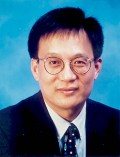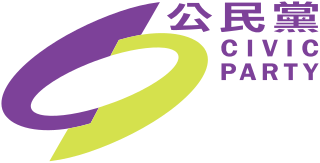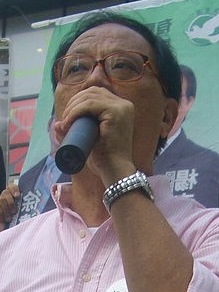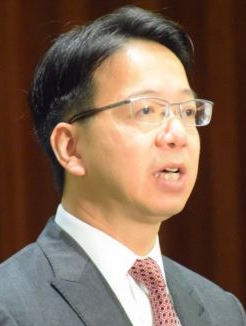
The Democratic Party (DP) is a liberal political party in Hong Kong. The party generally sits at the centre to centre-left of the Hong Kong political spectrum. Chaired by Lo Kin-hei, it is the flagship party in the pro-democracy camp and currently has no elected representatives in the District Councils.

Cyd Ho Sau-lan is a former member of the Legislative Council of Hong Kong (Legco) for the Hong Kong Island constituency.

The 2004 Hong Kong Legislative Council election was held on 12 September 2004 for members of the Legislative Council of Hong Kong (LegCo). The election returned 30 members from directly elected geographical constituencies and 30 members from functional constituencies, of which 11 were unopposed.
In the study of apportionment, the Harequota is the number of voters represented by each legislator under a system of proportional representation. In these voting systems, the quota is the number of votes that guarantees a candidate, or a party in some cases, captures a seat. The Hare quota is the total number of votes divided by the number of seats to be filled.

The Hong Kong Island geographical constituency was one of the five geographical constituencies in the elections for the Legislative Council of Hong Kong from 1998 to 2021. It was established in 1998 for the first SAR Legislative Council election and was abolished under the 2021 overhaul of the Hong Kong electoral system. In the 2016 Legislative Council election, it elected six members of the Legislative Council using the Hare quota of party-list proportional representation. The constituency covered all the four districts on the Hong Kong Island, namely, Central and Western, Eastern, Southern and Wan Chai. In 2020, it had 707,277 registered voters.

The Kowloon West geographical constituency was one of the five geographical constituencies of the Legislative Council of Hong Kong from 1998 to 2021. It was established in 1998 for the first SAR Legislative Council election and was abolished under the 2021 overhaul of the Hong Kong electoral system. In the 2016 Legislative Council election, it elected six members of the Legislative Council using the Hare quota of party-list proportional representation. It had 602,733 registered electorates in 2020. The constituency corresponded to the districts of Yau Tsim Mong, Sham Shui Po, and Kowloon City.

The New Territories East geographical constituency was one of the five geographical constituencies in the Legislative Council of Hong Kong. It was established in 1998 for the first SAR Legislative Council election and was abolished under the 2021 overhaul of the Hong Kong electoral system. It encompassed Sha Tin District, Tai Po District, North District and Sai Kung District. In the 2016 Legislative Council election, nine members of the Legislative Council using the Hare quota of party-list proportional representation with 1,139,616 electorates in 2020.

The New Territories West geographical constituency was one of the geographical constituencies in the Legislative Council of Hong Kong from 1998 to 2021. It was established in 1998 for the first SAR Legislative Council election and was abolished under the 2021 overhaul of the Hong Kong electoral system. Located in the western part of the New Territories, it was the largest geographical constituency in Hong Kong with 1,308,081 electorates in 2020. It consisted of Tsuen Wan District, Kwai Tsing District, Tuen Mun District, Yuen Long District and Islands District. In the 2016 Legislative Council election, it elected nine members of the Legislative Council using the Hare quota of party-list proportional representation.

The pro-democracy camp, also known as the pan-democracy camp, is a political alignment in Hong Kong that supports increased democracy, namely the universal suffrage of the Chief Executive and the Legislative Council as given by the Basic Law under the "One Country, Two Systems" framework.

The Civic Party (CP) was a pro-democracy liberal political party in Hong Kong.

The 2007 Hong Kong Island by-election was held on 2 December 2007 and was won by Anson Chan with 54.6% of the votes cast. It was precipitated by the death of the then chairman of the Pro-Beijing Democratic Alliance for the Betterment and Progress of Hong Kong (DAB) Ma Lik on 8 August 2007.

The 2008 Hong Kong Legislative Council election was held on 7 September 2008 for the 4th Legislative Council since the establishment of the Hong Kong Special Administrative Region. There were 60 seats in the 4th Legislative Council, with 30 members elected by geographical constituencies through direct elections, and 30 members by functional constituencies. Candidates for 14 functional constituency seats were unopposed.

The pro-Beijing camp, pro-establishment camp or pro-China camp is a political alignment in Hong Kong which generally supports the policies of the Beijing central government and the Chinese Communist Party (CCP) towards Hong Kong. The term "pro-establishment camp" is regularly in use to label the broader segment of the Hong Kong political arena which has the closer relationship with the establishment, namely the governments of the People's Republic of China (PRC) and the Hong Kong Special Administrative Region (HKSAR). Pro-Beijing politicians are labeled "patriots" by pro-Beijing media and "loyalists" by the rival pro-democracy camp.

The 2012 Hong Kong Legislative Council election was held on 9 September 2012 for the 5th Legislative Council (LegCo) since the establishment of the Hong Kong Special Administrative Region.

The 2016 Hong Kong Legislative Council election was held on 4 September 2016 for the 6th Legislative Council of Hong Kong (LegCo). A total of 70 members, 35 from geographical constituencies (GCs) and 35 from functional constituencies (FCs), were returned. The election came after the rejection of the 2016/2017 constitutional reform proposals which suggested the electoral method for the 2016 Legislative Council remains unchanged.

The 2015 Hong Kong District Council elections were held on 22 November 2015. Elections were held to all 18 District Councils with returning 431 members from directly elected constituencies after all appointed seats had been abolished.

The 2016 New Territories East by-election was held on 28 February 2016 after the incumbent Legislative Councillor Ronny Tong Ka-wah of New Territories East quit the Civic Party and resigned from the Legislative Council of Hong Kong (LegCo), effective on 1 October 2015.

These are the Hong Kong Island results of the 2004 Hong Kong legislative election. The election was held on 12 September 2004 and all 6 seats in Hong Kong Island were contested. The pro-democracy camp failed to win four out of six seats with the two tickets of the Democratic Party and Article 45 Concern Group's Audrey Eu and The Frontier's Cyd Ho joint ticket. The last-minute emergency call of Martin Lee cost the defeat of Cyd Ho in a narrow margin to Democratic Alliance for the Betterment of Hong Kong's (DAB) Choy So-yuk. Legislative Council President Rita Fan also contested in Hong Kong Island for the first time.

The 2018 Hong Kong Legislative Council by-election was held on 11 March 2018 for four of the six vacancies in the Legislative Council of Hong Kong (LegCo) - the Hong Kong Island, Kowloon West and New Territories East geographical constituencies and the Architectural, Surveying, Planning and Landscape functional constituency - resulting from the disqualification of six pro-democrat and localist camp Legislative Council members over the 2016 oath-taking controversy. The by-election for the two other seats was not held due to pending legal appeals by the two disqualified legislators.

The 2021 Election Committee subsector elections were held on 19 September 2021 for elected seats of the 1,500 members of the Election Committee (EC) which is responsible for electing 40 of the 90 seats in the Legislative Council (LegCo) in the 2021 election and the Chief Executive of Hong Kong (CE) in the 2022 election.




















